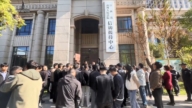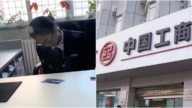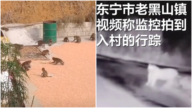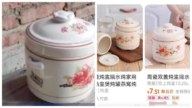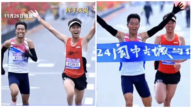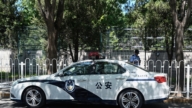【新唐人2013年12月28日讯】中共前总书记赵紫阳遗孀日前在北京去世。讣告中指出,赵夫人是在亲人陪伴和“庄严助念”中,安详辞世。赵紫阳女儿王雁南向本台记者透露,她母亲晚年接触到佛法,留下遗言﹕丧事从简。而赵紫阳的骨灰至今仍然安放家中,子女们准备将两位老人合葬。
赵紫阳家人最近两天向亲朋好友发出短信说,赵紫阳夫人梁伯琪,“在家人陪伴下和庄严助念中”,于今年12月25号晚间在北京医院辞世,宁静安详。享年95岁。
赵紫阳女儿王雁南告诉《新唐人》,他们家里已经布置了一个小小的灵堂,用来接待来悼念的亲戚、朋友。
王雁南:“后事呢,因为母亲有遗言,我们尊重母亲的遗言,就是丧事从简,不做遗体告别。只是做家庭式的告别。就是火化。火化完了以后还接妈妈回家。因为我父亲(骨灰)也是在家里的。那接下来怎么办的话,当然是入土为安。让他们两位老人家一起入土为安。”
赵紫阳在1989年民运中因同情抗议学生,遭到前中共领导人邓小平罢黜,随后被软禁在家至死。据香港《苹果日报》报导,赵紫阳于2005年1月去世后,因为当局要将他的骨灰放在 北京八宝山革命公墓的“司局级干部区”,赵的家人觉得“显然不合他的身份”,不同意当局的安排,于是将赵的骨灰一直存放在家中。
王雁南表示,父亲骨灰至今没有安葬,“是因为一直没有得到好的安葬的方法”。子女们希望两位老人家尽早的入土为安,但是安葬何处﹖目前还在商量。
在梁伯琪子女们发出的讣告中说,母亲在“庄严助念中”安详离世。“助念”是佛教用语,指某人临终时,请别人帮助他念佛,用念佛的功德,让他安乐自在,往生佛国。
王雁南透露,她的母亲晚年接触到佛法。
王雁南:“我不知道我父亲(的信仰),应该没有。我母亲有接触到佛法。助念就是说在心中怀着美好的愿望,帮助母亲能够……有说往生极乐,有说一路平安,安息,各种各样美好的愿望。”
王雁南说,父亲赵紫阳去世的时候,母亲身体已经很差了,梁伯琪直到临终,都不知道赵紫阳已经去世。
王雁南:“我们也是为了不忍心让她受这个打击,所以没有告诉。当然母亲很快就有一些老年痴呆的症状。后来常常会忘记。就不提这个事了。是,我们一直没有告诉她。”
但是赵紫阳的秘书鲍彤告诉《新唐人》,他在2008年探访梁伯琪的时候,感觉她心里是明白赵紫阳已经去世了。
前中共总书记赵紫阳秘书鲍彤:“我认为她是知道赵紫阳已经去世了。我想只是因为很悲痛,也不必谈这些事情了。所以她也没有跟子女谈这个事情而已。我2008年看到她的时候,她还是很清楚的。她记得我是谁,她还跟我说话。但是她讲话的里面的内容,使我能够理解,她早就知道赵紫阳去世了。”
对于鲍彤的猜测,王雁南认为,有可能是她的父母心灵相通。
王雁南:“也有可能。我想他们也会息息相通,心灵是相通的。”
有媒体报导,赵紫阳升任党和国家领导人后,全家虽在中南海生活,但梁伯琪并没有北京户口。关于这一点,王雁南对《新唐人》作了澄清。
王雁南:“有户口,通常这样的,他们一开始可能是集体户口,集体是跟机关。后来应该是转到住地了。当地街道。”
赵紫阳被罢黜后,先是被软禁于中南海家中。随后,他被“安置”在位于北京灯市口西街的富强胡同6号 。从此“富强胡同6号”便成了“军事管制区”。赵紫阳就在这个军事管制的软禁中度过了16年,直到2005年1月17号逝世。
采访编辑/秦雪 后制/李勇
Zhao Ziyang’s Widow Passes Away
Widow of late CCP chief Zhao Ziyang
died in Beijing this week.
Her obituary says she serenely passed away in the company
of her family members who made Buddhist prayers with her.
Her daughter Wang Yannan told our reporter that
after her mother’s encounter with Buddhism,
her last wish was to just have a very simple funeral.
Zhao Ziyang’s ashes remain at his family’s home.
Their children are preparing to bury their parents together
in their final resting place.
Zhao’s family recently sent text messages to relatives and
friends, saying that Zhao’s wife Liang Boqi passed away
“with family members as company while solemnly
making Buddhist prayers,” in Beijing Hospital
on the night of Dec. 25, at the ripe age of 95 years old.
Zhao’s daughter Wang Yannan told NTD a small mourning hall
has been set up in their home for receiving relatives and friends.
Wang Yannan: “Because mother’s last wishes were to have
the funeral be as simple as possible, and we respect her wish.
We’ll only have a family-style mourning
without a formal funeral service.
She’ll directly be cremated, and then we will bring her ashes
back home because my [father’s ashes] are also there.
Then we will bury their ashes together. ”
Because Zhao Ziyang sympathized with the student protesters
during the Democracy Movement in 1989, he was dismissed
from his position as Party Chief by ex-CCP leader
Deng Xiaoping and later put under house arrest until he died.
Hong Kong’s Apple Daily reports that after Zhao Ziyang died
in January 2005, CCP authorities prepared to put his ashes
in an area reserved for department and bureau level officials
in Beijing’s Babaoshan Revolutionary Cemetery.
Zhao’s family thought such an arrangement was
“obviously inconsistent with Zhao’s identity”
and did not agree it.
Zhao’s ashes have remained at home until now.
Wang Yannan says her father’s ashes have not been buried
until now “because a good burial hasn’t yet been decided on.”
Her siblings hope to bury the parents as soon as possible
but are still negotiating where to bury them.
The obituary issued by Liang Boqi’s children
says the mother serenely passed away
in the midst of reciting a Buddhist prayer.
During such a prayer, family members would together pray to
have the person on their deathbed enjoy happiness by merit of
praying to the Buddha and have them go to Buddha’s heaven.
Wang Yannan says her mother had encountered Buddhism
in her later years.
Wang Yannan: “I don’t know [my father’s faith], I don’t think
he held one. My mother knew of Buddhism.
[The prayers we joined her in] are to cherish best wishes,
praying with her to… some say so she can go to the heaven,
or to have a peaceful future, or various other good wishes.”
Wang Yannan says her mother’s health was very bad
at the time of her father Zhao Ziyang’s death.
Liang Boqi had no idea of Zhao Ziyang’s death
even when she died.
Wang Yannan: “We couldn’t bear to let her receive such a hit.
So this was not told to her.
My mother soon had minor symptoms of dementia.
Later she often forgot things. So we raise the issue.
Yes, we hadn’t told her all this time.”
However, Zhao Ziyang’s secretary Bao Tong told NTD that
when he visited Liang Boqi in 2008,
he sensed that she knew of Zhao’s death at heart.
Bao Tong: “I think she knew of Zhao Ziyang’s death.
She was in a deep sorrow and had no need to talk about it.
So she did not mention it with her children.
When I visited her in 2008, she was still very clearminded.
She remembered who I was and talked to me.
Some particular things she spoke of made me understand that
she knew Zhao’s death very early.”
From Bao Tong’s analysis, Wang Yannan says
she thinks that her parents must be connected at heart.
Wang Yannan: “Bao Tong may be right. I think they might
be telepathic with each other, or connected at heart.”
After Zhao Ziyang was promoted to being CCP chief, his wife
Liang Boqi reportedly had no Beijing hukou (a registered
residential certificate) despite his family living in Zhongnanhai.
Wang Yannan clarifies this point.
Wang Yannan: “She had a hukou. Usually, she may have had
a collective hukou, for governmental department employees.
But afterwards, her certificate ought to have been transferred
to a home address, the local street’s administrative unit.”
After Zhao Ziyang was ousted,
he was then under house arrest in Zhongnanhai.
Later, he was relocated to No. 6 Fuqiang Hutong and
Dengshikou West street, Beijing.
“No. 6 Fuqiang Hutong” was then
changed into a “military controlled area.”
Zhao spent 16 years here under house arrest
until he died on Jan. 17 , 2005.
Interview & Edit/QinXue Post-Production/LiYong



